HE is about to drive back Los Angeles. I had a smooth and enjoyable time here, and I hope my reporting about the various SBIFF events helped to some extent. Thanks to Roger Durling, managing director Sean Pratt and hospitality director Sherry Stimatz. Cheers and farewell. I promise to drive carefully.
Daily
“Silver Linings” Anniversary
Last night the Santa Barbara Film Festival had a special 10-years-after screening of Silver Linings Playbook, the greatest, funniest and edgiest feel-good romcom of the 21st Century. And then SBIFF honcho Roger Durling interviewed director David O. Russell and editor Jay Cassidy.
And the whole night was beautiful — re-watching it, listening to David and Jay’s recollections, recalling that big Toronto Film Festival debut and the Soho House after-party, and what a truly happy time 2012 was for Hollywood Elsewhere (and perhaps for millions of others)…a glorious feeling of engagement, flush wellness, reasonably high spirits and casual bon ami with everyone…Barack Obama was running for re-election and it was five or six years before woke horror…the terror!…descended and turned Hollywood life into a kind of early 1950s Commie-purge nightmare.
I wanted to speak with DOR at the after-party and share and radiate the usual usual, but somehow I sensed that strolling over and saying “hey, David” might not be a great idea. Tiny little needles were telling me that. Russell was friendly ten years ago, but he sure wasn’t last night. But it was mostly me. I’m funny that way. There’s a part of me that doesn’t feel all that good about social engagement…a part that would prefer to just go home and write about stuff and shine the face-time.
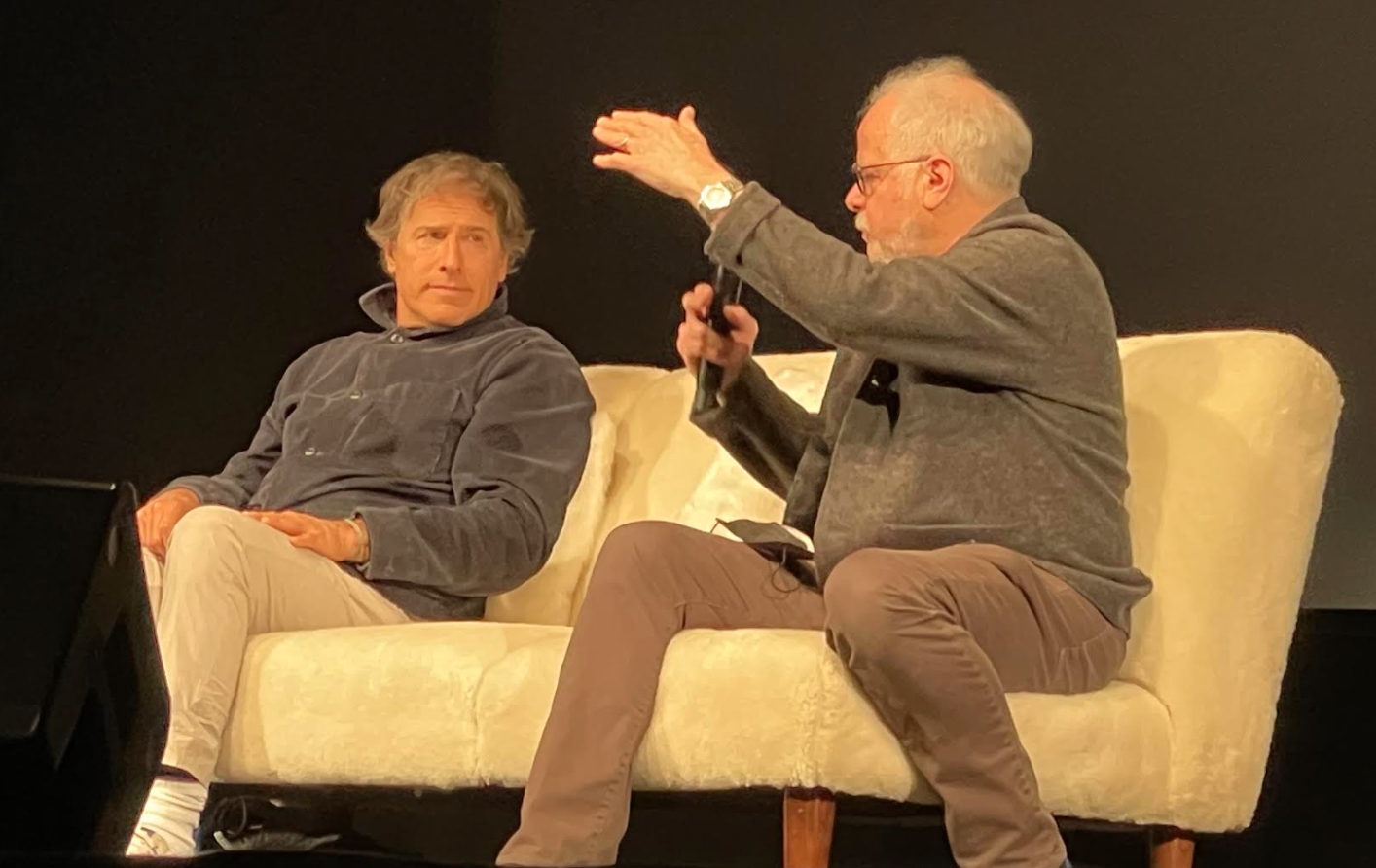
If I had manned up and managed to speak with Russell, you know what I might have asked him? Danny Elfman‘s Silver Linings score is one of the greatest ever composed, and I’m sure Russell agreeds with me. But you know what I might have asked about? His reaction to those recent photos of Mrs. Danny Elfman.
I know — stupid idea. It goes without saying that his response would have been totally private, but he wouldn’t have responded anyway because questions like that are out of bounds when it comes to chatting with someone like myself. I understand that, of course. But everyone was talking about it, and you know that Russell and his colleagues had reactions. This is why I don’t like going up to famous guys. Because certain things I might want to discuss would be “off-limits” (i.e., the famous guy would be afraid to share an honest opinion) and it’s like this weird dance…mention this but don’t mention that, and keep in mind which subjects are okay to mention and blah-dee-blah. It’s exhausting.
I still seethe, by the way, when I think back to the HE hate chorus that went after SLP, and the many hours I spent arguing with them and telling them how completely full-of-shit they were.
During the screening I was thinking back to that ridiculous Claude Brodesser-Akner Vulture piece that asked “Can the Romantic Comedy Be Saved?“.
HE response: “I’ve never called Silver Linings Playbook a romantic comedy, although it is comedic and unmistakably romantic at the end, and it does, to its detractors’ discomfort, use a familiar and formulaic romcom-type ending (although David O. Russell shapes and renders it in a novel, engaging, live-wire way). It’s a much smarter and deeper thing than your typical Kate Hudson or Katherine Heigel film, for sure, and much more skillfully made. But you wouldn’t be wildly off if you called it a ‘romantic comedy.’
“I would call Silver Linings a manic romantic dramedy about anxiety, obsession, family and sports-betting superstition. It obviously doesn’t walk or talk and go for the easy-lay emotion like the other romcoms, but it’s certainly an oddball cousin in the family.
“Which is why I find it staggering that Vulture‘s Claude Brodesser-Akner posted a piece today called ‘Can the Romantic Comedy Be Saved?,’ and he didn’t even MENTION Silver Linings Playbook.
“My first thought after I caught SLP in Toronto was ‘finally, a romantic comedy that I can not only stand but I actually like…this is how they should be made!” Brodesser-Akner could have disagreed and written that SLP actually isn’t a romcom and explained why, or mentioned it as a genre outlier or whatnot. But he doesn’t even acknowledge its EXISTENCE.
“To Brodesser-Akner SLP is so far outside the bounds of what a romantic comedy is that he doesn’t even acknowledge that Russell’s film at least vaguely qualifies for the reasons I mentioned above. He doesn’t even bring it up for the purpose of dismissing it. Amazing! Because he’s dead blind.”
Is Paris Burning?
We know it’s fake, but it’s pretty good. And chilling — we all get the point. It’s fairly amazing to consider the Roland Emmerich– or Michael Bay-level CG fakery that’s available these days to almost any enterprising online hoodwinker.

I Dream of Judean Toilets
Originally posted on 7.13.16: One thing you’ll never see explored or even mentioned in any historical film is the level of hygiene available to the main characters. I realize that nobody wants to hear this stuff, but can I at least write one short article about it? We’re all so accustomed to living in total hygienic splendor (huge bathrooms, dynamic showers, exotic soaps, dandified deodorants, perfumes, facial cremes, hair gels) that we tend to forget or ignore how unclean and smelly things were in the old days, especially before the 19th Century.
It follows that historical films, none of which have ever been captured or projected with Aromarama-like technology, have never gotten into this. Until fairly recently (i.e., before intensely realistic pics like The New World and The Revenant) everyone in every historical film from whatever century has always been presented as looking relatively clean and well-groomed, and by inference agreeable smelling. But the fact is that most people stunk like animals in centuries past.
As I mentioned four years ago there wasn’t even a White House bathtub with hot running water until Abraham Lincoln’s first term. And when you’re talking about ancient Rome and especially Judea, which will be represented a few weeks hence in Timur Bekmambetov‘s Ben-Hur, forget it.

By our standards almost everyone except the wealthiest ancient Romans almost certainly had odor issues to varying degrees. And don’t even mention plumbing or toilets. The upper-crusters of 2000 years ago who routinely visited the luxurious Roman baths had no toilet privacy and no toilet paper, and they all shared an assortment of vinegar-soaked sponges that were used, cleaned and re-used over and over. (I know and I’m sorry.) Some kind of toothbrushes were used by the Roman 1%, but minty toothpaste and alcohol-based mouthwash were of course non-existent.
How hygienic were the nomadic Jesus Christ and his disciples? Are you kidding me? They might have waded into a nearby river or in the Sea of Galilee from time to time or occasionally washed themselves next to a well, but they never saw any kind of soap their entire lives, they didn’t even know what a toilet seat looked like much less a hygienic sponge, and they certainly never owned toenail clippers or saw a pedicurist. (I wonder if Pontius Pilate was acquainted with that level of luxury?)
But all of this seems so gross to movie audiences it’s mostly not even hinted at, much less alluded to. And so almost all historic milieus are presented as relatively clean and fragrant and well-scrubbed as any pricey 20th or 21st Century home or restaurant or high-end health club. Or at least tolerable by our present standards.
Of course, our sense of aroma toleration changes with the eras. It wasn’t all that long ago when the smell of cigarette smoke was everywhere; now that’s all but gone, even in European environments that used to reek of unfiltered Gauloises as recently as 15 or 20 years ago.
More “Don’t Say Gay” Action
“The same thing with the race…with the CRT [critical race theory] thing. I feel like it’s disingenuous when the liberals say, you know, ‘We just want to teach history.’ And like, no one’s against…well, I’m sure there some fuckin’ rednecks who are against [this] but most reasonable people are not against realistically teaching history. It’s not like you can’t mention slavery. They’re telling you about something else that is going on.
“I’ve read too many reports, too many first-person reports from teachers who say, ‘I can’t go on teaching like this because this is insanity what I’m doing in this classroom, separating kids by race and oppressors and non-oppressors. And they’re little kids.”
Get It Straight, Kenneth
The fabled “Summer of Love” happened from May to September of ‘67…okay?
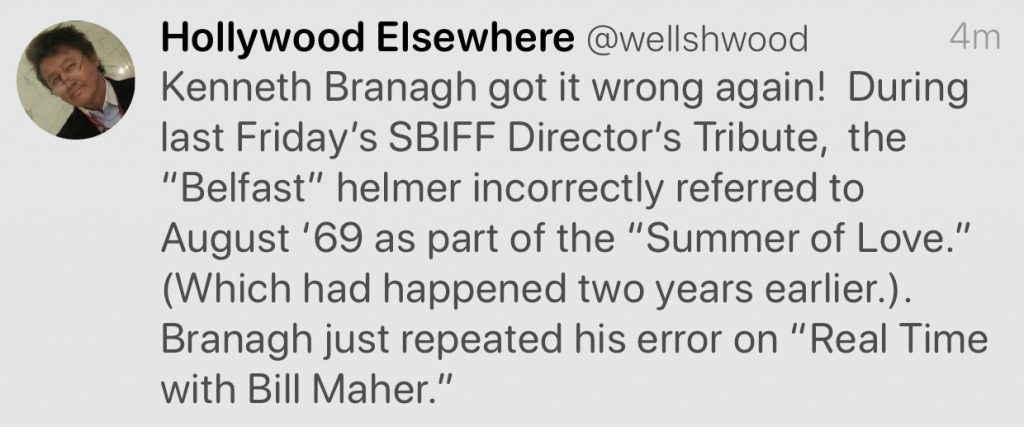
On The Other Hand
…if you happen to be on domestic terms with an admirer of Vladimir Putin as well as one who repeats his bullshit about the Ukrainian government being run by Nazis and whatnot…well, that’s kinda like living with Madison Cawthorn.
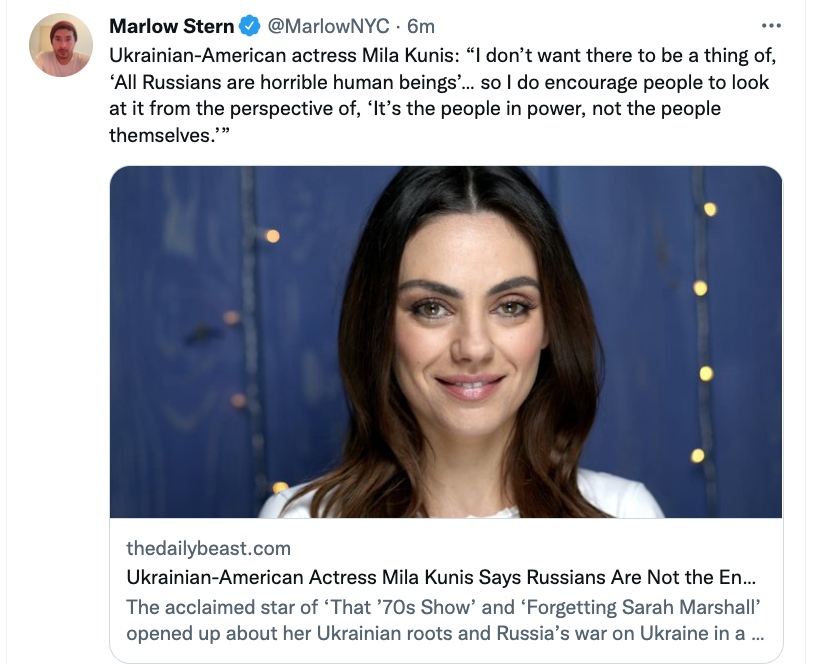

Did You Know?
…and do you care that three big awards ceremonies are happening this weekend? The Directors Guild Awards are happening Saturday, and we all know that’s a lock for The Power of the Dog‘s Jane Campion along with The Lost Daughter‘s Maggie Gyllenhaal for First-Time Feature. Then comes the BAFTA awards on Sunday afternoon (12 noon Pacific) but that organization has been more or less woked and Stalinized to death so nobody cares. Then comes the Critics Choice awards on Sunday evening, but they’re also on their own little orbit. Not even nominating Parallel Wives‘ Penelope Cruz for Best Actress constitutes some kind of aesthetic blockage, no?
Welcome to Londongrad
I’d like to be able to lie and get away with it, but the truth is this: If I could somehow become the recipient of a sizable amount of Russian cash, I would probably take it and run like a thief. I feel ashamed to admit this.
Kremlin-backed millionaires “can rinse their dirty money clean by buying up the most expensive houses in London,” says @JonathanPieNews, a fictional newscaster created by the British comedian Tom Walker. “It’s how the U.K. makes money.” https://t.co/8JBC3lueAv pic.twitter.com/NAoV7ib0pD
— New York Times Opinion (@nytopinion) March 11, 2022
Rage of Red Panda
Directed and co-written by Domee Shi, Turning Red (Pixar, 2.11) is a big deal in Asian-American circles as it focuses on on Meilin “Mei” Lee, a 13-year-old Chinese-Canadian student who lives in Toronto. The basic hook is that Mei “is horrified to discover that whenever she gets too excited or stressed, she turns into a giant red panda.” But the importance of Turning Red is that it’s only the second animated film to feature an Asian lead character, the first being 2009’s Up.
In a recent Cinemablend review, Sean O’Connell wrote that Turning Red seems to have been inspired by Michael J. Fox‘s Teen Wolf (’85). He also said that Turning Red wasn’t his cup of tea. For the crime of saying this, O’Connell was villified yesterday. Asian-American Film Twitter wanted his throat cut.
Angrily disagreeing with a review is par for the course, but calling for a critic to be drawn and quartered is what Stalinist wokesterism is all about.
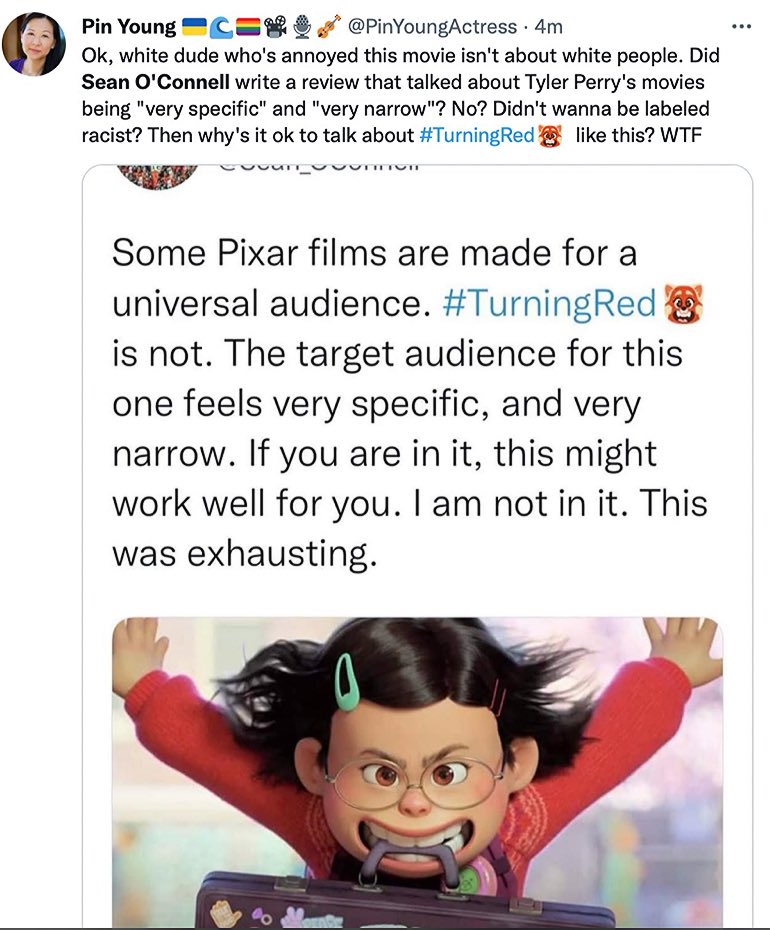
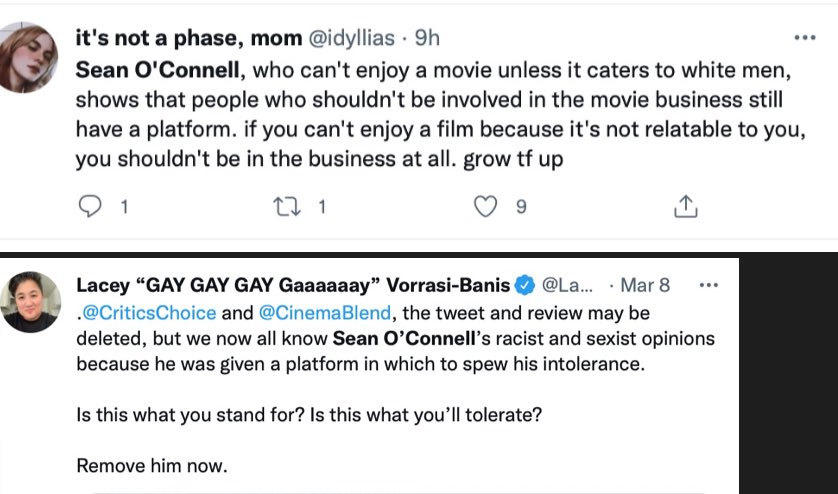
I’ll Bet Putin Could Handle The Vocals
If Vlady knows “Blueberry Hill” and has the courage to sing it front of a celebrity audience, he could certainly do “Jailhouse Rock.” Imagine!
Manhattan Project Presentism
Remember the legendary Jen Yamato, one of Hollywood’s leading advocates for Presentism and Tribal Representation, complaining to Joel and Ethan Coen in 2016 about Hail Caesar, which is set in 1951, being almost entirely cast with white people?
Yamato: “I asked the Coens to respond to criticisms that there aren’t more minority characters in the film. In other words, why is #HailCaesarSoWhite?”” In response to which Joel and Ethan basically called Yamato an idiot who knew nothing about how stories are written.
“It’s an absolute, absurd misunderstanding of how things get made to single out any particular story and say, ‘Why isn’t this, that or the other thing [included]?’’ Joel said. ‘It’s a fundamental misunderstanding of how stories are written. So you have to start there and say, ‘You don’t know what you’re talking about.’
Well, wokester “presentism” is back with an ardor and a vengeance, it would seem. Certain Twitter psychos are complaining that Christopher Nolan‘s currently shooting Oppenheimer is guilty of the same thing. As Cleavon Little might have said in Blazing Saddles, “Hey, where all da black and Asian people at?”
The reason that the cast of Oppenheimer is seemingly all Anglo Saxon is presumably because history tells us that the Manhattan Project principals were entirely Anglo Saxon. Yes, I realize that the real reason is that Nolan is a racist who is foursquare against casting actors of color — he’s not fooling anybody! But at the same time the history of the Manhattan Project has been researched and reported, and it is what it is.
Yolando Machado? Mett Jen Yamato!



